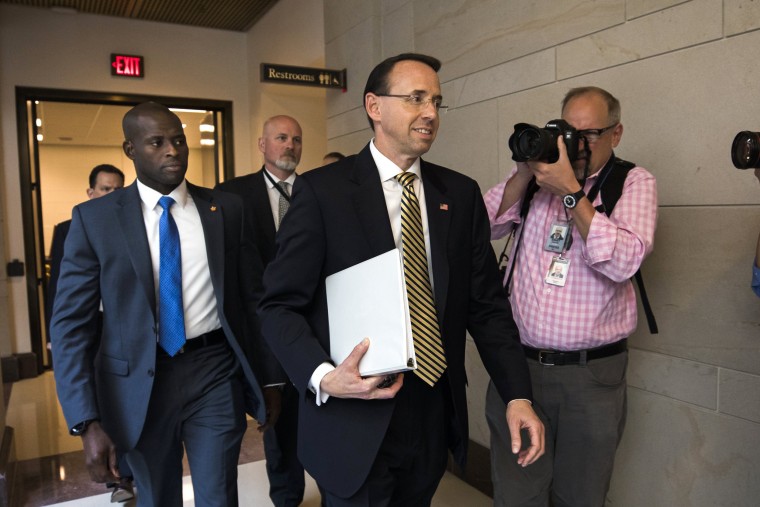WASHINGTON — Deputy Attorney General Rod Rosenstein Thursday told the U.S. Senate that he was aware of President Donald Trump's decision to fire FBI Director James Comey before he wrote the president a memo saying he had lost confidence in the director, according to members who attended the briefing.
Rosenstein's admission came during a closed-door briefing for all 100 senators where he addressed the latest questions arising from a stream of controversy surrounding Comey's dismissal and the investigation into Russian interference into last year’s election.
"He knew that Comey was going to be removed prior to his removal," said Sen. Claire McCaskill, D-Missouri, after the briefing.
"He knew the day before," the firing, said Sen. Dick Durbin, D-Ill., who added that Rosensteil said he was not pressured to write the memo.
The White House initially said Comey's firing was made based on the recommendation by Rosenstein. That explanation was contradicted by the president himself, who told NBC News last week that he decided to fire Comey "regardless" of the memo.
Then, on Thursday, Trump again pointed to Rosenstein's "very, very strong letter" as a primary reason for the firing.
Rosenstein's highly-anticipated appearance came after a week of major developments that flowed from the Comey firing. Reports that Comey had written memos of his conversations with the president, including assertions that Trump has sought to tamp down the FBI's investigation emerged this week. And finally, on Wednesday, Rosenstein appointed a special counsel, former FBI Director Robert Mueller, to lead the investigation.
After Comey’s firing, Rosenstein initially drew the ire of Democrats on Capitol Hill, but he seemed to have regained some good faith after his appointment of Mueller, a move Democrats had been nearly unanimous in supporting.
Even Republicans who had said they were opposed to the creation of a new investigator signaled support of the move. Sen. James Lankford, R-Okla., and member of the Senate Intelligence Committee, said Mueller is the right choice because the investigation could move more quickly.
“If he is able to come in as a former FBI director, use the FBI agents that are already there, use the process that’s already in the place, this will actually get to resolution much faster. That’s a benefit to us,” Lankford said.
But Senator Lindsey Graham, R-S.C., said that the appointment of the special counsel will severely limit the capabilities of the ongoing Congressional investigations. Additionally, he said he got the impression from the briefing that Rosenstein believed there are criminal elements to it.
"My takeaway is everything he said is you have to treat this as if it's a criminal investigation," Graham said. "So I think the biggest legal change seems to be that Mr. Mueller is going to proceed forward with the idea that this as criminal investigation instead of a counter intelligence investigation."
Most members of both parties, however, left the briefing saying they didn't learn much new.
"It was a good briefing but there was nothing earth shattering," Sen. Bob Corker, R-Tenn., said. "It was really not a big deal, just be honest."
Sen. Bob Casey, D-Penn., was one of many Democrats who left the meeting disappointed.
"We still have questions and we’ll be outlining those in the days ahead," Casey said.
Senators said that Rosenstein made clear that he has ceded all authority over the investigation over to Mueller.
Sen. Marco Rubio, R-Fla., also a member of the Intelligence Committee said that the federal investigation won’t interfere the Senate’s investigation.
“We have two very different missions. Our investigation is a counterintelligence one. Their’s obviously is a different realm in the Justice Department, so I’m not concerned that it would impede,” Rubio said.
"If one thing is clear from the meeting it is that Mr. Mueller has broad and wide ranging authority to follow the facts wherever they go, and that gives me some confidence and should give American people some confidence. Because he is a man of great integrity and experience," Senate Minority Leader Chuck Schumer said.
The Senate investigation seems to have hit a roadblock, however. Sen. Richard Burr, R-N.C., indicated Thursday morning that former National Security Director Michael Flynn had chosen not to comply with a subpoena issued for documents related to the Russia probe. But a spokesman for the senator later said that Flynn still has time to comply if he chooses to.
“General Flynn's attorneys have not yet indicated their intentions regarding the Senate Intelligence Committee's subpoena. Consistent with the Committee's position since the beginning of or investigation, I welcome their willingness to cooperate,” Burr spokeswoman Rebecca Glover said.

